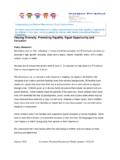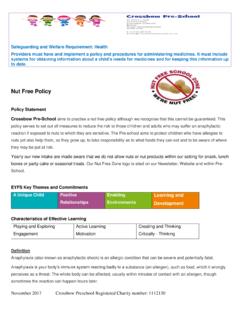Transcription of Achieving Positive Behaviour and Anti Bullying Policy
1 Safeguarding and Welfare Requirements: Managing Behaviour . Providers must have and implement a Behaviour management Policy and procedures. Achieving Positive Behaviour and anti Bullying Policy Policy Statement Our setting believes that children flourish best when their personal, social and emotional needs are met and where there are clear and developmentally appropriate expectations for their Behaviour . Children need to learn to consider the views and feelings, needs and rights, of others and the impact that their Behaviour has on people, places and objects. This is a developmental task that requires support, encouragement, teaching and setting the correct example. The principles that underpin how we achieve Positive and considerate Behaviour exist within the programme for promoting personal, social and emotional development.
2 EYFS Key Themes and Commitments A Unique Child Positive Relationships Enabling Environments Learning and Development Characteristics of Effective Learning Playing and Exploring Active Learning Creating and Thinking Critically - Engagement Motivation Thinking Procedures We have a named person who has overall responsibility for our programme for supporting personal, social and emotional development; including issues concerning Behaviour : Our Named Behaviour Co-ordinator is Greg Wood. Daily implementing is shared between all staff January 2018 Crossbow Preschool Registered Charity number: 1112130. We require the named person to: - keep up-to-date with legislation, research and thinking on promoting Positive Behaviour and on handling children's Behaviour where it may require additional support;. - access relevant sources of expertise on promoting Positive Behaviour within the programme for supporting personal, social and emotional development.
3 - Crossbow Pre-School keep a record of staff attendance at this training. We recognise that codes for interacting with other people vary between cultures and require staff and committee members to be aware of and respect those used by members of the setting. We require all staff, committee members, volunteers and students to provide a Positive model of Behaviour by treating children, parents and one another with friendliness, care and courtesy. We familiarise new staff, committee members and volunteers with the setting's Achieving Positive Behaviour Policy and its guidelines for Behaviour . We expect all members of our setting - children, committee members, parents, staff, volunteers and students - to keep to the guidelines, requiring these to be applied consistently. We work in partnership with children's parents.
4 Parents are regularly informed about their children's Behaviour by their key person. We work with parents to address recurring inconsiderate Behaviour , using our observation records to help us to understand the cause and to decide jointly how to respond appropriately. Strategies with children who engage in inconsiderate Behaviour We require all staff, volunteers and students to use Positive strategies for handling any inconsiderate Behaviour , by helping children find solutions in ways which are appropriate for the children's ages and stages of development. Such solutions might include acknowledgement of feelings, explanation as to what was not acceptable and supporting children to gain control of their feelings so that they can learn a more appropriate response. We use strategies of Conflict Resolution Techniques and a sand timer.
5 Both encourage critical thinking, problem solving and children to develop skills in sharing, mediation and reflection. We ensure that there are enough popular toys and resources and sufficient activities available so that children are meaningfully occupied without the need for unnecessary conflict over sharing and waiting for turns. We acknowledge considerate Behaviour such as kindness and willingness to share. January 2018 Crossbow Preschool Registered Charity number: 1112130. We support each child in developing self-esteem, confidence and feelings of competence. We support each child in developing a sense of belonging in our group, so that they feel valued and welcome. We avoid creating situations in which children receive adult attention only in return for inconsiderate Behaviour . When children behave in inconsiderate ways, we help them to understand the outcomes of their action and support them in learning how to cope more appropriately.
6 We never send children out of the room by themselves, nor do we use a naughty chair' or a time out' strategy that excludes children from the group. We never use physical punishment, such as smacking or shaking. Children are never threatened with these. We do not use techniques intended to single out and humiliate individual children. We use physical restraint, such as holding, only to prevent physical injury to children or adults and/or serious damage to property. Details of such an event (what happened, what action was taken and by whom, and the names of witnesses) are brought to the attention of our setting's Leader and are recorded in the child's personal file. The child's parent is informed on the same day. We do not shout or raise our voices in a threatening way to respond to children's inconsiderate Behaviour .
7 In cases of serious misbehaviour, such as racial or other abuse, we make clear immediately the unacceptability of the Behaviour and attitudes, by means of explanations rather than personal blame (children and their parents). In unavoidable circumstances where serious misbehaviour threatens or results in injury to themselves or other children or staff (especially if the child cannot be calmed or the victim consoled). the child displaying the serious misbehaviour will be temporality sent home and welcomed back on their next session. This temporary and brief absence provides reflection and the opportunity of a fresh start. January 2018 Crossbow Preschool Registered Charity number: 1112130. Children under three years When children under three behave in inconsiderate ways we recognise that strategies for supporting them will need to be developmentally appropriate and differ from those for older children.
8 We recognise that very young children are unable to regulate their own emotions, such as fear, anger or distress, and require sensitive adults to help them do this. Common inconsiderate or hurtful behaviours of young children include tantrums, biting or fighting. Staff are calm and patient, offering comfort to intense emotions, helping children to manage their feelings and talk about them to help resolve issues and promote understanding. If tantrums, biting or fighting are frequent, we try to find out the underlying cause - such as a change or upheaval at home, or frequent change of carers. Sometimes a child has not settled in well and the Behaviour may be the result of separation anxiety'. We focus on ensuring that a child has an attachment figure in the setting and that this key person is building a strong relationship to provide security for the child.
9 Rough and tumble' play and fantasy aggression Young children often engage in play that has aggressive themes such as superhero and weapon play. Some children appear pre-occupied with these themes, but their Behaviour is not necessarily a precursor to hurtful Behaviour or Bullying , although it may be inconsiderate at times and may need addressing using strategies as above. We recognise that teasing and rough and tumble play are normal for young children and acceptable within limits. We regard these kinds of play as pro-social and not as problematic or aggressive. We will develop strategies to contain play that are agreed with the children, and understood by them, with acceptable behavioural boundaries to ensure children are not hurt. We recognise that fantasy play also contains many violently dramatic strategies - blowing up, shooting etc.
10 , and that themes often refer to goodies and baddies' and as such offer opportunities for us to explore concepts of right and wrong. Other concepts explored are cause and effect and separation and reunion. January 2018 Crossbow Preschool Registered Charity number: 1112130. We are able to tune in to the content of the play, perhaps to suggest alternative strategies for heroes and heroines, making the most of teachable moments' to encourage empathy and lateral thinking to explore alternative scenarios and strategies for conflict resolution. Hurtful Behaviour We take hurtful Behaviour very seriously. Most children under the age of five will at some stage hurt or say something hurtful to another child, especially if their emotions are high at the time, but it is not helpful to label this Behaviour as Bullying '. For children under five, hurtful Behaviour is momentary, spontaneous and often without cognisance of the feelings of the person whom they have hurt.



